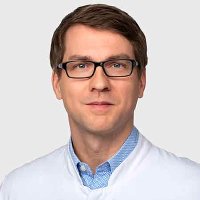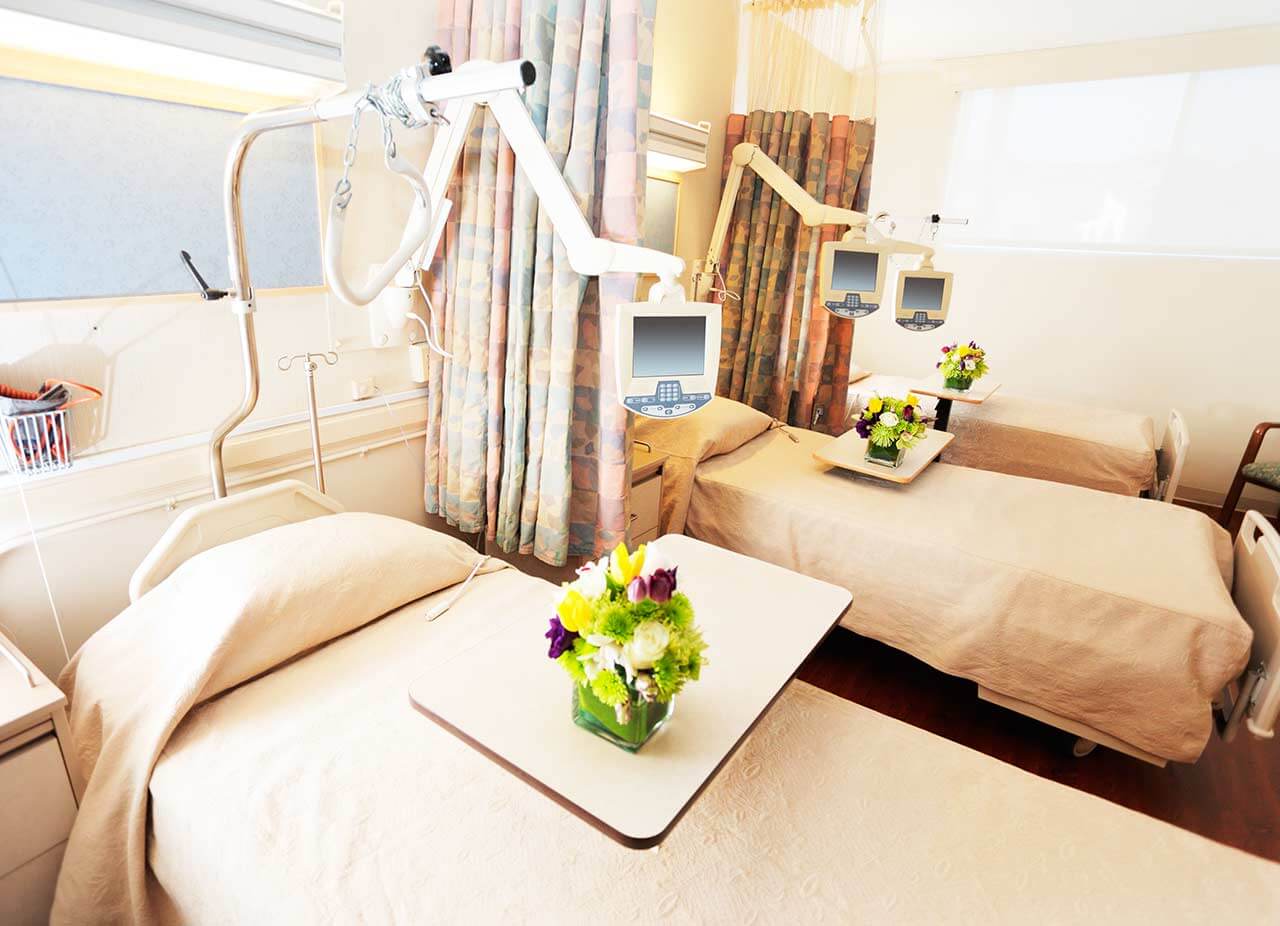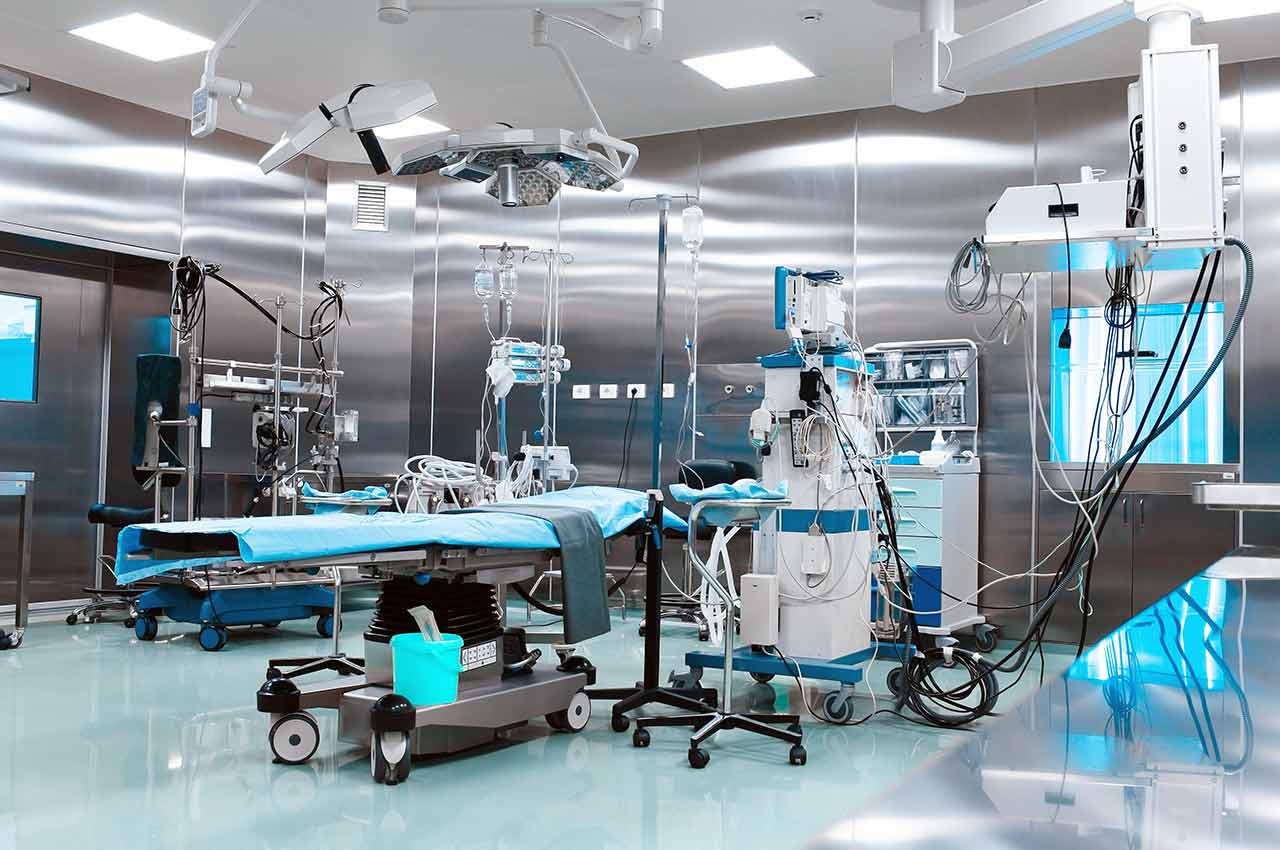
The program includes:
- Initial presentation in the clinic
- clinical history taking
- physical examination
- review of medical records
- laboratory tests:
- complete blood count
- general urine analysis
- biochemical analysis of blood
- TSH-basal, fT3, fT4
- indicators of inflammation (CRP, ESR)
- indicators blood coagulation
- abdominal ultrasound
- CT/MRI abdomen
- colonoscopy
- preoperative care
- surgical sphincter reconstruction
- symptomatic treatment
- control examinations
- the cost of essential medicines and materials
- nursing services
- nutrition recommendations
- full hospital accommodation
- explanation of future recommendations
Required documents
- Medical records
- Anal sphincter ultrasound (if available)
- Pelvic MRI (if available)
Service
You may also book:
 BookingHealth Price from:
BookingHealth Price from:
About the department
The Department of General and Abdominal Surgery, Endocrine Surgery, Hepatopancreatobiliary Surgery, Colorectal Surgery, Hernia Surgery, Thoracic Surgery and Vascular Surgery at the Park-Clinic Weissensee Berlin offers the full range of high-quality surgical treatment in all areas of its specialization. The department's team of surgeons has a successful experience in surgical treatment of abdominal wall pathologies and gastrointestinal diseases. Also, it has a perfect command of minimally invasive surgical techniques. The specialists of the medical facility perform surgical treatment using the NOTES technique, natural orifice transluminal endoscopic surgery. Clinical practice's key focus is treating gastrointestinal cancers, which involves specialists from related medical fields. Bowel cancer treatment provided in a specialized center certified by the German Cancer Society (DKG) is of particular interest in cancer surgery. Surgical treatment in the department meets all the standards of modern medicine and guarantees patients the most effective results. The department is headed by PD Dr. med. Carsten Kamphues.
General and abdominal surgery is responsible for treating benign and malignant diseases of the digestive system: stomach, bowel and esophageal cancers, diverticular disease, gastroesophageal reflux disease, ulcers, etc. The department annually admits more than 2,500 patients with gastrointestinal diseases, about 1,400 of whom undergo surgical treatment. In most cases, operations are performed using minimally invasive techniques. In addition, with appropriate clinical indications, patients are offered the innovative NOTES technique (natural orifice transluminal endoscopic surgery). This technique is highly safe, while its effectiveness is in no way inferior to open interventions.
An important focus of the specialists' work is on treating colon cancer, the second most common cause of deaths from cancers. Since more and more people suffer from bowel cancer every year, a specialized center for this disease was created on the basis of the department. The specialists of the Colon Cancer Center work in accordance with the requirements of the German Cancer Society (DKG), offering patients all modern medical services for prevention, diagnostics, treatment, and follow-up care. The department's surgeons adhere to a comprehensive approach to treatment. Therefore, in addition to surgical interventions, patients receive chemotherapy, radiation therapy, pain management, psycho-oncological care, nutrition consultations and other types of care necessary to achieve an optimal result. Bowel cancer is especially dangerous because it does not cause any symptoms for a long time, and when the first complaints appear in patients, the advanced stages of the oncological process are often detected, the treatment of which is a complex task. Diagnostics for bowel cancer include laboratory tests, gastroscopy, colonoscopy, endosonography, capsule endoscopy, CT, MRI, and biopsy. The required complex of examinations is determined based on a particular clinical case. The next stage of the therapeutic process is an interdisciplinary tumor board, during which doctors study the data obtained and develop treatment tactics. In most cases, patients with bowel cancer require multimodal therapy that combines surgery, chemotherapy, radiation therapy, antibody therapy, and other techniques. After the completion of treatment, patients should undergo regular follow-up examinations and follow the recommendations of their attending physician.
Special attention should be given to hernia repair surgery, which is part of the department's tasks. The service range includes operations for umbilical, inguinal, incisional, diaphragmatic and femoral hernias. The standard techniques for hernia repair are mesh surgery, Shouldice technique, and Lichtenstein hernia repair. Depending on a particular case, the operations can be performed under general or local anesthesia. The department's surgeons perform more than 650 hernia repair surgeries every year. Preference is always given to sparing endoscopic techniques, while open surgery is performed only in complex cases.
The team of endocrine surgeons of the medical facility admits patients with benign and malignant diseases of the thyroid gland, parathyroid glands and adrenal glands. When performing interventions for endocrine pathologies, surgeons use modern neuromonitoring systems and a binocular loupe, which guarantee not only effective surgical treatment, but also high safety of the operation, because they eliminate the risk of damage to the recurrent laryngeal nerve that may cause voice loss. Endocrine surgery specialists often perform partial and total thyroid resections (hemithyroidectomy and total thyroidectomy) and parathyroid resections. As for operations on the adrenal glands, most of them are for tumor removal, while the specialists often manage to save the organ. An indisputable advantage for the department's patients is the fact that almost all endocrine interventions are performed using minimally invasive techniques, so patients have a speedy recovery and do not experience severe pain.
Hepatopancreatobiliary surgery is an integral part of the department's clinical activities. The surgeons of this specialization treat liver, gallbladder, bile duct, and pancreatic diseases. The most common diagnoses include pancreatitis, pancreatic cancer, parasitic liver cysts, liver adenomas and hemangiomas, liver cancer and liver metastases caused by cancers of other localizations, gallbladder inflammation and obstructive processes in the bile ducts. With appropriate indications, low-traumatic interventions are performed. For some gallbladder and biliary duct pathologies, modern surgical technique (NOTES) with access through the natural openings of the body is used. For example, the most sparing method of gallbladder removal in women with gallstone disease is NOTES surgery, in which access is provided through the vagina, without any skin incisions.
Colorectal surgeons treat patients with rectal cancer and anal pathologies. The advanced transanal minimally invasive surgery (TAMIS) technique is successfully used to treat rectal cancer in its early stages. This excludes traumatic skin and soft tissue incisions. Patients with hemorrhoids, anal fistulas and fissures quite often seek medical attention from the department as well. These pathologies are treated with sparing and highly effective techniques, in particular sclerotherapy, latex ligation, and others.
The department also offers modern surgical treatment of diseases of the respiratory system and chest. The surgeons perform operations for lung cancer, thymomas, mediastinal tumors, bronchiectasis, tracheal stenosis, pleural empyema, pneumothorax, lung abscesses, and other diseases. Open surgery is performed only in particularly complex cases, and video-assisted thoracoscopic surgery (VATS) is the standard surgical treatment. These minimally invasive procedures use a thoracoscope (a tiny video camera) and special surgical instruments that are inserted through small incisions between the 7th and 8th ribs. The thoracoscope allows doctors to transmit images of the inner surface of the chest with high resolution to a large screen, so that a surgeon can perfectly see the smallest anatomical structures of the surgical field. The final stage of the operation is the application of absorbable sutures. In most cases, patients leave the hospital within 1-3 days after the intervention.
The department's surgical options are complemented by interventions for vascular diseases. Of key interest is the treatment of varicose veins and deep vein thrombosis. The medical facility also performs interventions to form dialysis access and place port systems.
The department's range of surgical services includes:
- General and abdominal surgery
- Surgery for benign gastrointestinal diseases: gastroesophageal reflux disease, stomach ulcers, appendicitis, etc.
- Surgery for malignant gastrointestinal diseases: stomach, bowel, esophageal cancers, etc.
- Endocrine surgery
- Surgery for benign and malignant thyroid, parathyroid and adrenal diseases (partial and total resections)
- Hepatopancreatobiliary surgery
- Surgery for benign liver, gallbladder, bile duct and pancreatic diseases: pancreatitis, parasitic liver cysts, liver adenomas and hemangiomas, gallbladder inflammatory diseases, and bile duct obstruction
- Surgery for malignant liver, gallbladder, bile duct and pancreatic diseases: liver cancer and liver metastases, pancreatic, gallbladder and bile duct cancers
- Colorectal surgery
- Surgery for benign diseases: hemorrhoids, anal fistulas, and fissures
- Surgery for malignant diseases: rectal cancer
- Surgical treatment of hernias
- Surgery for umbilical, inguinal, incisional, diaphragmatic, and femoral hernias
- Thoracic surgery
- Surgery for benign diseases: bronchiectasis, tracheal stenosis, pleural empyema, pneumothorax, and lung abscesses
- Surgery for malignant diseases: lung cancer, thymomas, and mediastinal tumors
- Vascular surgery
- Surgery for varicose veins and deep vein thrombosis
- Surgery for the formation of dialysis access and the placement of port systems
- Other medical services
Curriculum vitae
Professional Career
- Since 2022 Head Physician of the Department of General and Abdominal Surgery, Endocrine Surgery, Hepatopancreatobiliary Surgery, Colorectal Surgery, Hernia Surgery, Thoracic Surgery and Vascular Surgery at the Park-Clinic Weissensee Berlin.
- 2016 - 2022 Senior Physician, Department of General, Abdominal and Vascular Surgery, Charite University Hospital Berlin.
- 2015 - 2016 Assistant Physician, Department of General, Abdominal and Vascular Surgery, Charite University Hospital Berlin.
- 2007 - 2015 Assistant Physician, Department of General, Abdominal and Transplant Surgery, Charite University Hospital Berlin.
- 2005 - 2007 Assistant Physician, Department of General Surgery, Hospital Kemperhof Koblenz.
Higher Education
- 2014 Habilitation in Surgery. Subject: "Assessment of prognostic markers and research of new models of targeted therapy for biliopancreatic carcinoma".
- 1998 - 2005 Medical studies, RWTH Aachen University.
Board Certification
- 2013 Board certification in Abdominal Surgery and Special Abdominal Surgery.
- 2010 Board certification in Surgery.
Qualifications
- 2019 Fellow of the European Board of Surgery (FEBS) in Cancer Surgery.
- 2019 Fellow of the American College of Surgeons (FACS).
- 2014 - 2016 Master of Health Business Administration (MHBA), Friedrich Alexander University Erlangen-Nuremberg.
Memberships in Professional Societies
- German Society of Surgery (DGCH).
- German Society for General and Visceral Surgery (DGAV).
- Association Surgical Oncology (ACO).
- European Society of Surgical Oncology (ESSO).
- Berlin Surgical Society.
- German Pancreatic Club.
- European Pancreatic Club.
- International Hepato-Pancreato Biliary Association (IHPBA).
- Working Group for Patients after Pancreatectomy (ADP), self-care group.
Photo of the doctor: (c) Park-Klinik Weißensee GmbH
About hospital
The Park-Clinic Weissensee Berlin is a progressive medical facility with the highest standards of medical care. The medical facility is an academic hospital of the Charite University Hospital Berlin, thanks to which the specialists have access to all medical innovations. The clinic was opened on April 1, 1997, on the former Weissensee Municipal Hospital site. The building of the medical facility has been completely renovated, so today, patients can enjoy the excellent infrastructure and state-of-the-art medical equipment.
The clinic has 350 beds for inpatient treatment. More than 17,000 inpatients receive treatment here annually. More than 8,500 surgical interventions are performed in state-of-the-art operating rooms of the clinic. Patients' health is in the safe hands of a large team of doctors and nursing staff, numbering more than 700 employees. The focus of the specialists' efforts is a patient and their health problem, for the elimination of which many effective treatment methods are available.
The clinic's departments are headed by reputable specialists who keep pace with medical innovations. The medical center is distinguished by its unique experience and high competence in treating bowel and breast cancer, gastrointestinal diseases, rheumatic pathologies, gynecologic cancers, and hernias. The clinic also specializes in treating spinal diseases and stroke, knee and hip replacement surgery, aesthetic and functional surgery of the nasal cavity, frontal and maxillary sinuses. In addition, the clinic has the Department of Imaging Diagnostics, the Diagnostic Laboratory, and the Department of Physiotherapy.
In addition to the highest quality of medical service, the staff of the clinic care about the comfort of their patients' stay within its walls. The medical facility has a beautiful interior, which was created by students and graduates of the Weissensee Academy of Art. The clinic is decorated with beautiful paintings and sculptures: artistic compositions can be seen both on the walls of the corridors, and in cafes and patient rooms. The clinic is also surrounded by a beautiful park, which is immersed in the greenery of various trees and shrubs in spring and summer.
Photo: (с) depositphotos
Accommodation in hospital
Patients rooms
The patients of the Park-Clinic Weissensee Berlin live in comfortable rooms. The standard patient room includes an automatically adjustable bed, a bedside table, a wardrobe, a table and chairs for receiving visitors, as well as a TV and a radio. Wi-Fi is also available in the patient rooms.
A great advantage for patients is the location of the clinic in a picturesque park. The patients of the medical center enjoy walking in the park, which is decorated with beautiful sculptures. Walks provide an opportunity to escape from the therapeutic process and enjoy the natural landscape.
Meals and Menus
A patient and their accompanying person are offered a daily choice of three menus. If, for some reason, you do not eat all the foods, please inform the medical staff in advance and you will be offered an individual menu.
There is also a cafe, Picknick im Park, on the territory of the clinic, which offers full breakfasts, various snacks, hot and cold drinks, as well as a large assortment of delicious cakes.
Further details
Standard rooms include:
Accompanying person
Your accompanying person may stay with you in your patient room or at the hotel of your choice during the inpatient program.
Hotel
You may stay at the hotel of your choice during the outpatient program. Our managers will support you for selecting the best option.





